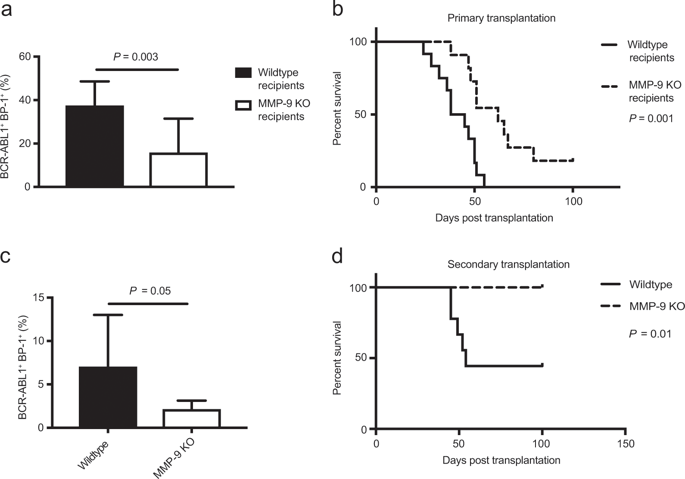Our official English website, www.x-mol.net, welcomes your feedback! (Note: you will need to create a separate account there.)
Bone marrow niche-derived extracellular matrix-degrading enzymes influence the progression of B-cell acute lymphoblastic leukemia.
Leukemia ( IF 11.4 ) Pub Date : 2020-01-09 , DOI: 10.1038/s41375-019-0674-7 Divij Verma 1 , Costanza Zanetti 1 , Parimala Sonika Godavarthy 1 , Rahul Kumar 1 , Valentina R Minciacchi 1 , Jakob Pfeiffer 1 , Markus Metzler 2 , Sylvain Lefort 3 , Véronique Maguer-Satta 3 , Franck E Nicolini 4 , Barbara Burroni 5 , Michaela Fontenay 6 , Daniela S Krause 1, 7, 8, 9, 10
Leukemia ( IF 11.4 ) Pub Date : 2020-01-09 , DOI: 10.1038/s41375-019-0674-7 Divij Verma 1 , Costanza Zanetti 1 , Parimala Sonika Godavarthy 1 , Rahul Kumar 1 , Valentina R Minciacchi 1 , Jakob Pfeiffer 1 , Markus Metzler 2 , Sylvain Lefort 3 , Véronique Maguer-Satta 3 , Franck E Nicolini 4 , Barbara Burroni 5 , Michaela Fontenay 6 , Daniela S Krause 1, 7, 8, 9, 10
Affiliation

|
Specific and reciprocal interactions with the bone marrow microenvironment (BMM) govern the course of hematological malignancies. Matrix metalloproteinase-9 (MMP-9), secreted by leukemia cells, facilitates tumor progression via remodeling of the extracellular matrix (ECM) of the BMM. Hypothesizing that leukemias may instruct the BMM to degrade the ECM, we show, that MMP-9-deficiency in the BMM prolongs survival of mice with BCR-ABL1-induced B-cell acute lymphoblastic leukemia (B-ALL) compared with controls and reduces leukemia-initiating cells. MMP-9-deficiency in the BMM leads to reduced degradation of proteins of the ECM and reduced invasion of B-ALL. Using various in vivo and in vitro assays, as well as recipient mice deficient for the receptor for tumor necrosis factor (TNF) α (TNFR1) we demonstrate that B-ALL cells induce MMP-9-expression in mesenchymal stem cells (MSC) and possibly other cells of the BMM via a release of TNFα. MMP-9-expression in MSC is mediated by activation of nuclear factor kappa B (NF-κB) downstream of TNFR1. Consistently, knockdown of TNF-α in B-ALL-initiating cells or pharmacological inhibition of MMP-9 led to significant prolongation of survival in mice with B-ALL. In summary, leukemia cell-derived Tnfα induced MMP-9-expression by the BMM promoting B-ALL progression. Inhibition of MMP-9 may act as an adjunct to existing therapies.
中文翻译:

骨髓小生境来源的细胞外基质降解酶影响B细胞急性淋巴细胞白血病的进展。
与骨髓微环境(BMM)的特异性相互作用和相互影响控制着血液系统恶性肿瘤的进程。白血病细胞分泌的基质金属蛋白酶9(MMP-9)通过重塑BMM的细胞外基质(ECM)促进肿瘤进展。假说白血病可能指示BMM降解ECM,我们证明,与对照组相比,BMM中MMP-9缺陷可延长BCR-ABL1诱导的B细胞急性淋巴细胞白血病(B-ALL)小鼠的存活并降低白血病起始细胞。BMM中MMP-9缺陷导致ECM蛋白质降解降低,B-ALL侵袭降低。使用各种体内和体外测定,以及缺乏肿瘤坏死因子(TNF)α(TNFR1)受体的受体小鼠,我们证明了B-ALL细胞通过释放可诱导间充质干细胞(MSC)和其他可能的BMM细胞表达MMP-9 TNFα。MSC中MMP-9的表达是通过激活TNFR1下游的核因子κB(NF-κB)介导的。一致地,在B-ALL起始细胞中敲低TNF-α或MMP-9的药理抑制作用导致B-ALL小鼠的生存期显着延长。总之,来自白血病细胞的Tnfα通过促进B-ALL进展的BMM诱导了MMP-9表达。抑制MMP-9可以作为现有疗法的辅助手段。MSC中MMP-9的表达是通过激活TNFR1下游的核因子κB(NF-κB)介导的。一致地,在B-ALL起始细胞中敲低TNF-α或MMP-9的药理抑制作用导致B-ALL小鼠的生存期显着延长。总之,来自白血病细胞的Tnfα通过促进B-ALL进展的BMM诱导了MMP-9表达。抑制MMP-9可以作为现有疗法的辅助手段。MSC中MMP-9的表达是通过激活TNFR1下游的核因子κB(NF-κB)介导的。一致地,在B-ALL起始细胞中敲低TNF-α或MMP-9的药理抑制作用导致B-ALL小鼠的生存期显着延长。总之,来自白血病细胞的Tnfα通过促进B-ALL进展的BMM诱导了MMP-9表达。抑制MMP-9可以作为现有疗法的辅助手段。
更新日期:2020-01-09
中文翻译:

骨髓小生境来源的细胞外基质降解酶影响B细胞急性淋巴细胞白血病的进展。
与骨髓微环境(BMM)的特异性相互作用和相互影响控制着血液系统恶性肿瘤的进程。白血病细胞分泌的基质金属蛋白酶9(MMP-9)通过重塑BMM的细胞外基质(ECM)促进肿瘤进展。假说白血病可能指示BMM降解ECM,我们证明,与对照组相比,BMM中MMP-9缺陷可延长BCR-ABL1诱导的B细胞急性淋巴细胞白血病(B-ALL)小鼠的存活并降低白血病起始细胞。BMM中MMP-9缺陷导致ECM蛋白质降解降低,B-ALL侵袭降低。使用各种体内和体外测定,以及缺乏肿瘤坏死因子(TNF)α(TNFR1)受体的受体小鼠,我们证明了B-ALL细胞通过释放可诱导间充质干细胞(MSC)和其他可能的BMM细胞表达MMP-9 TNFα。MSC中MMP-9的表达是通过激活TNFR1下游的核因子κB(NF-κB)介导的。一致地,在B-ALL起始细胞中敲低TNF-α或MMP-9的药理抑制作用导致B-ALL小鼠的生存期显着延长。总之,来自白血病细胞的Tnfα通过促进B-ALL进展的BMM诱导了MMP-9表达。抑制MMP-9可以作为现有疗法的辅助手段。MSC中MMP-9的表达是通过激活TNFR1下游的核因子κB(NF-κB)介导的。一致地,在B-ALL起始细胞中敲低TNF-α或MMP-9的药理抑制作用导致B-ALL小鼠的生存期显着延长。总之,来自白血病细胞的Tnfα通过促进B-ALL进展的BMM诱导了MMP-9表达。抑制MMP-9可以作为现有疗法的辅助手段。MSC中MMP-9的表达是通过激活TNFR1下游的核因子κB(NF-κB)介导的。一致地,在B-ALL起始细胞中敲低TNF-α或MMP-9的药理抑制作用导致B-ALL小鼠的生存期显着延长。总之,来自白血病细胞的Tnfα通过促进B-ALL进展的BMM诱导了MMP-9表达。抑制MMP-9可以作为现有疗法的辅助手段。


























 京公网安备 11010802027423号
京公网安备 11010802027423号